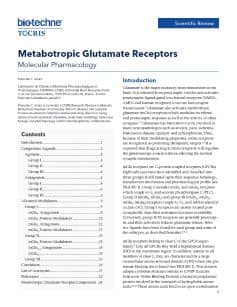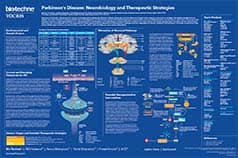Glutamate (Metabotropic) Receptors
Metabotropic glutamate receptors (mGlus) are coupled to a variety of second messenger systems via G proteins. To date, eight different mGlu subtypes (mGlu1-8) have been cloned and subsequently expressed in various cell lines. These receptors have been classified into 3 groups based on amino acid sequence similarity, agonist pharmacology and the signal transduction pathways to which they couple.
Glutamate (Metabotropic) Receptor Target Files
Related Targets
Group I mGlu receptors (mGlu1 and mGlu5) stimulate inositol phosphate metabolism and mobilization of intracellular Ca2+, whereas group II (mGlu2 and mGlu3) and group III (mGlu4 and mGlu6-8) couple to adenylyl cyclase. In addition to the above groups, a fourth (as yet unassigned) group of metabotropic glutamate receptors which couple to phospholipase D has been reported.
Literature for Glutamate (Metabotropic) Receptors
Tocris offers the following scientific literature for Glutamate (Metabotropic) Receptors to showcase our products. We invite you to request* your copy today!
*Please note that Tocris will only send literature to established scientific business / institute addresses.
Addiction Poster
The key feature of drug addiction is the inability to stop using a drug despite clear evidence of harm. This poster describes the brain circuits associated with addiction, and provides an overview of the main classes of addictive drugs and the neurotransmitter systems that they target.
Depression Poster
Major depressive disorder is characterized by depressed mood and a loss of interest and/or pleasure. Updated in 2015 this poster highlights presynaptic and postsynaptic targets for the potential treatment of major depressive disorder, as well as outlining the pharmacology of currently approved antidepressant drugs.
Parkinson's Disease Poster
Parkinson's disease (PD) causes chronic disability and is the second most common neurodegenerative condition. This poster outlines the neurobiology of the disease, as well as highlighting current therapeutic treatments for symptomatic PD, and emerging therapeutic strategies to delay PD onset and progression.
Metabotropic Glutamate Receptor Data
| Receptor Subtype | Group I | Group II | Group III | PLD Coupled mGlu Receptor |
|---|---|---|---|---|
| Subtypes |
mGlu1 mGlu5 |
mGlu2 mGlu3 |
mGlu4 mGlu6 mGlu7 mGlu8 |
Undetermined |
| Transduction Mechanism | ↑ PLC | ↓ AC | ↓ AC | ↑ PLD |
| Example Agonists |
L-Quisqualic acid (0188) (S)-3,5-DHPG (0805) CHPG (1049) |
DCG-IV (0975) L-CCG-I (0333) (2R,4S)-APDC (1208) LY 379268 (2453) LY 354740 (3246) |
L-AP4 (0103) (S-3,4-DCPG (1302) ACPT I (1111) (RS)-PPG (1220) VU 0155041 (3248) |
L-CSA (0216) |
| Example Antagonists |
CPCCOEt (1028) AIDA (0904) Fenobam (2386) MPEP (1212) LY 367385 (1237) YM 298198 (2448) |
(RS)-APICA (1073) EGLU (0971) LY 341495 (1209) |
CPPG (0972) MAP4 (0711) MSOP (0803) UBP 1112 (1369) MMPIP (2963) |
(RS)-3,5-DHPG (0342) |
Properties of Selected Metabotropic Glutamate Receptor Antagonists
Group I
| Antagonist | mGlu1a | mGlu5a | mGlu2 | mGlu3 | mGlu4 | mGlu6 | mGlu7 | mGlu8 |
|---|---|---|---|---|---|---|---|---|
| (S)-MCPG (0337) | 124-543 (Kb) |
154-460 (Kb) > 2000 (Kb) |
15 (Ki) | 317 (Ki) | > 1000 (IC50) | > 100 (IC50) | > 1000 (IC50) | 320 (IC50) |
| (S)-4CPG (0323) | 15-182 (Kb) |
> 1000 (Kb) 145 (Kb) > 300 (Kb) |
366 (Ki) Weak agonist |
ND | > 1000 (IC50) | Weak agonist | ND | Agonist |
| (S)-4C3HPG (0320) | 11.5-393 (Kb) |
157 (Kb) |
Agonist | ND | > 1000 (IC50) | ND | ND | Agonist |
| AIDA (0904) | 3.4 (pKb) | > 1000 (IC50) | Weak agonist | ND | > 1000 (IC50) | ND | ND | ND |
| CPCCOEt (1028) | 4.76 (pKb) | > 100 (IC50) | > 100 (IC50) | ND | > 100 (IC50) | ND | > 100 (IC50) | > 100 (IC50) |
| MPEP (1212) | > 100 (IC50) | 0.032 (IC50) | > 100 (IC50) | ND | > 100 (IC50) | > 100 (IC50) | > 100 (IC50) | ND |
| SIB 1757 (1215) | > 1000 (IC50) | 0.4 (IC50 | > 30 (IC50) | ND | > 30 (IC50) | > 30 (IC50) | > 30 (IC50) | > 30 (IC50) |
| SIB 1893 (1214) | > 30 (IC50) | 0.3 (IC50) | > 30 (IC50) | ND | > 30 (IC50) | > 30 (IC50) | > 30 (IC50) | > 30 (IC50) |
| LY 367385 (1237) | 8.8 (IC50) | > 100 (IC50) | ND | ND | ND | ND | ND | ND |
| 3-MATIDA (2196) | 6.3 (IC50) | > 300 (IC50) | > 300 (IC50) | ND | > 300 (IC50) | ND | ND | ND |
Group II and III
| Antagonist | mGlu1a | mGlu5a | mGlu2 | mGlu3 | mGlu4 | mGlu6 | mGlu7 | mGlu8 |
|---|---|---|---|---|---|---|---|---|
| MPPG (0853) | 1100 (IC50) | No effect | 12 (Ki) | ND | 22 (KD) | 138 (Kb) | ND | 20 (IC50) |
| MAP4 (0711) | No effect | ND |
15 (Ki) Weak agonist |
ND |
36 (KD) 190 (Ki) |
Weak moderate agonist | ND | 25 (IC50) |
| DCG IV (0975) | 389 (IC50) |
630 (IC50) |
Agonist | Agonist | 22.5 (IC50) | 39.6 (IC50) | 40.1 (IC50) | 32 (IC50) |
| ACPT-II (1112) | 115 (Kb) | ND | 88 (Kb) | ND | 77 (Kb) | ND | ND | 123 (IC50) |
| LY 341495 (1209) | 6.8 (IC50) | 8.2 (IC50) | 0.002 (Ki) | 0.001 (Ki) | 22 (IC50) | ND | 0.99 (IC50) | 0.173 (IC50) |
References
Doherty et al (1999) Br.J.Pharmacol. 126 205. Lin et al (1997) Neuropharmacology 36 917. Brabet et al (1995) Neuropharmacology 34 895. Cartmell et al (1998) Br.J.Pharmacol. 123 497. Laurie et al (1995) Naunyn-Schmied.Arch.Pharmacol. 351 565. Hayashi et al (1994) J.Neurosci. 14 3370. Laurie et al (1997) Neuropharmacology 36 145. Saugstad et al (1994) Mol.Pharmacol. 45 367. Saugstad et al (1997) Mol.Pharmacol. 51 119. Thomsen et al (1994) Eur.J.Pharmacol.Mol.Pharmacol.Sect. 267 77. De Colle et al (2000) Eur.J.Pharmacol. 394 17. Kingston et al (1995) Neuropharmacology 34 887. Bršuner-Osborne et al (1998) Eur.J.Pharmacol. 350 311. Hermans et al (1999) Br.J.Pharmacol. 126 873. Moroni et al (1997) J.Pharmacol.Exp.Ther. 281 721. Hermans et al (1998) Neuropharmacology 37 1645. Litschig et al (1999) Mol.Pharmacol. 55 453. Gasparini et al (1999) Neuropharmacology 38 1493. Varney et al (1999) J.Pharmacol.Exp.Ther. 290 170. Thomsen et al (1996) Mol.Pharmacol. 50 6. Kowal et al (1998) Soc.Neurosci.Abstr. 24 576. Abe et al (1992) J.Biol.Chem. 267 13361. Sekiyama et al (1996) Br.J.Pharmacol. 117 1493. Brabet et al (1998) Neuropharmacology 37 1043. Acher et al (1997) J.Med.Chem. 40 3119. Clark et al (1997) Bioorg.Med.Chem. 7 2777. Johnson et al (1999) Neuropharmacology 38 1519. Moroni et al (2002) Neuropharmacology 42 741.



